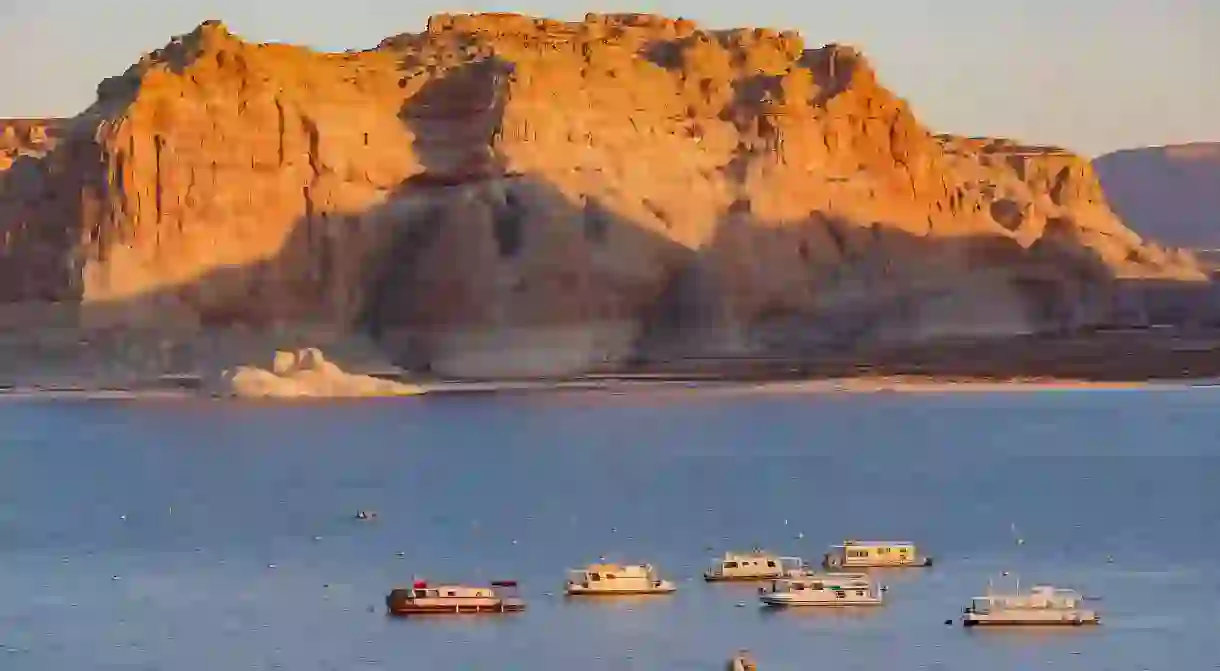The Most Beautiful Lakes in the US

zFrom an aquamarine crater lake in Oregon to waterfall-fed waters in Colorado, the United States is blessed with some seriously striking lakes. Here are the most beautiful.
Lake George, New York
Spanning 45sqmi (117sqkm) in the protected Adirondack region, the Queen of American Lakes dazzles with clear waters – fed by mountain streams and submerged springs – and myriad little islands emerging from them. More than 170 of these islands can be seen on the lake, with one home to the lavish Sagamore Resort. Also look out for the imposing stone mansions on the water’s edge where Gilded Age robber barons once lived.

Lake Powell, Utah and Arizona
Ideal for hiking and water sports, Lake Powell attracts more than 3m visitors every year. It is the second-largest artificial reservoir in the US, storing water that pours into more than 90 side canyons. The lake is surrounded by the Glen Canyon National Recreation Area, which is marked by red sandstone cliffs, as well as the sandstone Rainbow Bridge, one of the largest natural bridges in the world.

Lake Santeetlah, North Carolina
Deep within the Nantahala National Forest lies this paradise of calm waters and abundant greenery. Covering 3,000 acres (1,214ha), the artificial Lake Santeetlah is perfect for fishing, paddling and canoeing, and is home to wildlife such as otters, beavers and hawks. The shoreline extends for 76mi (122km), offering majestic views of the Great Smoky Mountains and about 200mi (322km) of hiking trails. The lake is also adjacent to the Joyce Kilmer Memorial Forest.

Crater Lake, Oregon
This aquatic wonder was formed around 8,000 years ago when volcanic Mount Mazama collapsed, leaving a smouldering caldera behind. At 1,943ft (592m) deep, Crater Lake is the deepest lake in the US, and its remarkably transparent waters are penetrated by sunlight nearly 400ft (122m) down. There’s no better place to test your scuba-diving skills, or to see the fuzzy black bears and yellow-bellied marmots that frequent Crater Lake National Park.

Lake Tahoe, California and Nevada
Framed by the Sierra Nevada Mountains on the California–Nevada border, Lake Tahoe is the largest alpine lake in North America and the second-deepest (at 1,645ft / 501m) in the US. Put the numbers aside, though, this spectacular lake is particularly beautiful with different shades of blue and an average clarity of 75ft (23m). From South Lake Tahoe, you can marvel at gorgeous waterfalls, while North Lake Tahoe is home to many ski resorts.

Caddo Lake, Texas and Louisiana
More a maze shaped by swampy marshes and backwaters than a mere lake, Caddo Lake is named after the Caddoans or Caddo, the Native Americans who lived in the area until they were driven out in the 19th century. It’s now an internationally protected wetland, with one of the largest flooded cypress forests in the US. The best way to experience the lake is by boat or canoe – just beware of lurking alligators.

Mono Lake, California
Popular among photographers and birdwatchers, Mono Lake stands out for having other-worldly tufa towers – spires made from calcium carbonate – the result of a reaction between the calcium-rich underground springs and the carbonate-heavy lake water. Mono spans 65sqmi (169sqkm) and its glossy water is three times saltier than the ocean; this makes it easier for trillions of tiny brine shrimp to hatch every spring, and in turn nourish millions of migratory birds.

Hanging Lake, Colorado
Although swimming is banned, Hanging Lake is still a just reward for the hikers who follow the short but precipitous trail along Glenwood Canyon in Colorado. The view of the peaceful, emerald waters, combined with the dreamy waterfalls spurting from the cliffs, makes up for the strenuous hike. During the winter, the trail is usually covered in compacted ice and snow, so be prepared for a slippery walk.

Lake Superior, Michigan
With a shoreline that stretches 2,700mi (4,345km), Lake Superior is the largest freshwater lake in the world, which explains the rather grand name. Hiking and kayaking are some of the best ways to explore the sandstone cliffs, immense waterfalls and little rocky islands of this enormous lake. The shoreline is dotted with quaint lighthouses, including the beautiful Whitefish Point Light.

Flathead Lake, Montana
Cradled between the Mission Mountains to the east and the Salish Mountains to the west, Flathead Lake has an unusually mild climate for the region, allowing fruit orchards and vineyards to flourish. The area features a national wildlife refuge and six state parks, including Wild Horse Island, home to wild horses and bighorn sheep.














